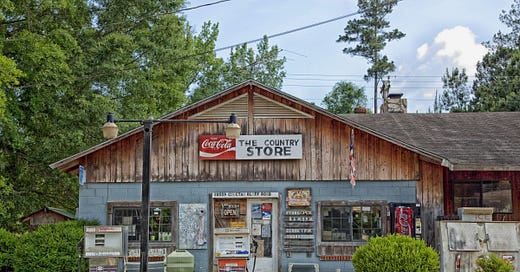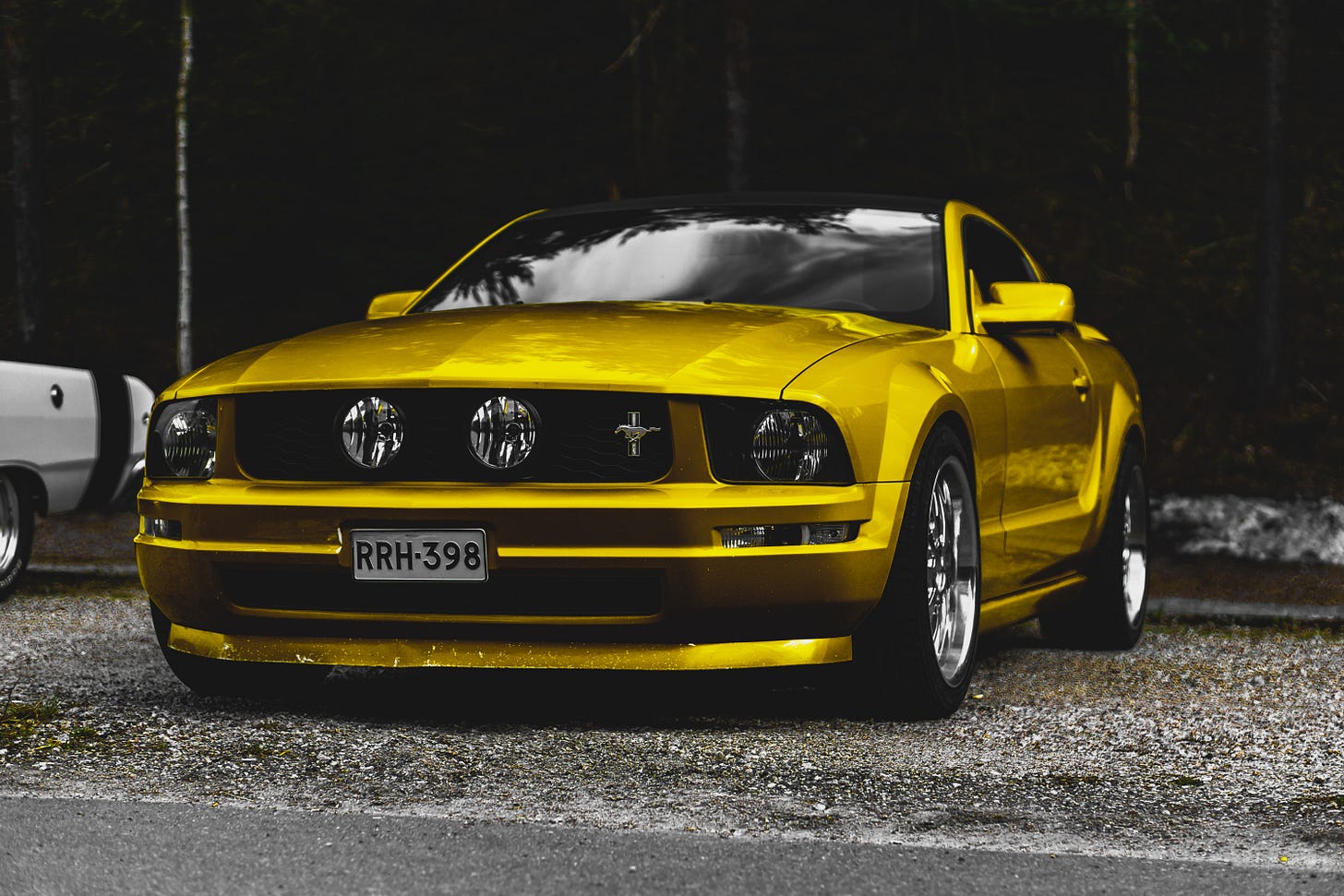The Summer Job I’ll Never Forget
A story about a country store, a yellow Mustang, and the home of the Ku Klux Klan
During the summer after my first year at the University of Arkansas, I secured a job at a Lincoln Mercury dealership owned by one of my older cousins. It was the mid-1970s, and my entrepreneur cousin was kind of a big deal. At the time, his dealership did well enough to rank in the BE100s — Black Enterprise Magazine’s list of the most successful Black-owned companies.
Since I was a member of the family, I had a place to live rent-free. He even had a swimming pool. But there was one drawback: my cousin’s car business was in a small Tennessee town about twenty miles north of Huntsville, Alabama.
My job was to assist in the parts department and occasionally deliver a new car to a customer. Since I was the boss’s cousin, the guys in the dealership’s service department went out of their way to make me feel at home.
That said, it was apparent that the townsfolk weren’t accustomed to seeing many Black people. When Ronnie, the head of the service department, took me to a diner in the town square for breakfast, the crowded room of white patrons stopped eating their meals and stared at me in astonishment.
But after my cousin (who insisted on introducing me as his nephew ) took me around town a few days later, the stares gradually abated. I think his status as the town’s largest employer outweighed the town’s uneasiness with my Blackness.
Pretty soon, I began to fit in. No longer viewed as ‘the boss’s cousin,’ I was one of the service department guys. Sometimes after work, the guys even invited me out for a beer — Tuborg Gold — from an ice chest in the back of Ronnie’s truck.
One day, Ronnie asked me to deliver a car to a town about thirty minutes away. I was to swap the truck I drove for a yellow Ford Mustang. “It’s got a T-top sunroof, so you’ll love driving it,” he said as he handed over the keys to an old blue truck in the parking lot.
I used a paper map in the truck’s glove box to make my way to Pulaski, about 45 minutes away. Before long, I reached the rendezvous point, a small country store surrounded by miles and miles of cornfields.
To say my destination was in the middle of nowhere is an understatement. But when I saw the bright yellow Mustang backed onto a sloped, gravel road across the highway from the store, I knew I had the right place. I walked through a screen door and into the store.
I was greeted by a scene straight out of Mississippi Burning. The store had one narrow aisle with shelves of canned goods stacked high on either side. Straight ahead was a counter with a large, old-fashioned cash register sitting on top.
Behind the counter stood a man I assumed was the store’s proprietor. In front of the counter, sitting in a chair, sat a large, red-faced man wearing bib overalls and a dirty, tank top-style t-shirt underneath.
Two or three equally red-faced men stood silently around the seated man. The man in the chair had a gigantic pickle barrel positioned between his legs. On top of the pickle barrel, lay a checkerboard. From the looks of things, I’d interrupted a game of checkers.
No one spoke as I walked down the aisle. The men seemed frozen, and stared at me as though I were a visitor from another planet.
A pang of fear stabbed me deep in the pit of my stomach as I instinctively began to evaluate my surroundings. An alarm inside my head screamed ‘danger.’ Slowly, I continued up the narrow aisle, approaching the man behind the counter.
Without saying a word, he tossed me a set of keys, pointing to the yellow Mustang across the highway. The men stationed around the barrel continued staring. None of them said a word. I couldn’t leave the store fast enough. Keys in hand, I retreated down the store’s narrow aisle and out of the store.
As I rushed across the deserted highway, I heard the store’s screen door slam behind me. The group of men filed out of the store one by one, watching me as I hurried across the road and into the Mustang.
The bright yellow car was beautiful. I sat behind the wheel, savoring the smell of its plush leather interior, looking through the transparent T-top roof overhead. I admired the state-of-the-art stereo system and the leather-covered stickshift as I reached for the ignition.
Then my heart stopped. I looked across the highway at the group of staring men, still staring at me from across the road. I revved the Mustang’s engine, with no idea how to drive a standard shift vehicle. As I tried to drive the car forward, the engine stalled out several times—the Mustang rolling backward down the sloped road each time.
Finally, I shot up the gravel road and onto the highway, throwing a massive arc of gravel into the air behind me. I drove down the road, the yellow vehicle jerking as I shifted gears; I glanced in the rearview mirror. The men still stood outside the store, staring as I drove away.
Back at the dealership that afternoon, I told the guys at the dealership about my experience. As we stood in the parking lot around Ronnie’s truck, they glanced at one another and burst into laughter.
The good old boys in the service department thought it would be funny to send me to Pulaski, Tennessee, which, unbeknownst to me, was the birthplace of the Ku Klux Klan. I listened to them in a state of shock as they backslapped each other. I was so embarrassed and angry I nearly dropped my bottle of Tuborg Gold.
I’ll never know if I was in danger in Pulaski, Tennessee. Maybe the red-faced men at the country store had nothing to do with the Klan. Perhaps they weren’t used to seeing Black people. Maybe they thought I was staring at them.
At the end of the summer, I left the job at my cousin’s car dealership and headed back to school. Before long, I forgot about my summer job and the visit to that small town in Tennessee. But whenever I see a yellow Mustang, I feel a jolt of pain deep in the pit of my stomach.
Your support for The Journeyman makes a difference. If you haven’t already done so, please consider becoming a subscriber.







Hi Marlon, I really enjoyed that story. Thanks for sharing it.